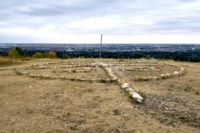MLA Neudorf presents party’s sector-based approach for economic recovery
By Tim Kalinowski on April 30, 2021.
LETHBRIDGE HERALDtkalinowski@lethbridgeherald.com
Lethbridge-East MLA Nathan Neudorf spoke to the Southern Alberta Council on Public Affairs in his capacity as chair of the UCP’s government’s Standing Committee on Alberta’s Economic Future during its weekly YouTube livestream speaker series on Thursday.
Neudorf addressed various topics related to Alberta’s post-pandemic recovery, and offered a hopeful assessment that his government’s sector by sector approach to economic stimulus measures, and its emphasis on diversifying its energy sector, would pay dividends as Alberta begins to emerge from one of its bleakest economic eras.
He illustrated this approach by using Lethbridge and southern Alberta as an example.
“One of the things when we looked at restarting the economy obviously the buzzwords for many governments around the country for many years has been about diversity,” Neudorf explained. “One of the benefits of Lethbridge is we have not seen the ups and downs, because we are not an oil and gas based economy. We are much more an agricultural based economy. So being able to speak to strategic investments that support that kind of growth– things like the Highway 3 twinning between Taber and Burdett. Though it is not within the city limits of Lethbridge, you can see how that adds safety and transport to our food processing facilities, of which we have many.”
Neudorf said provincial investments in the airport, alongside those highway investments, also foster growth of the private sector in southern Alberta.
“We have added dollars to our Lethbridge Airport,” he explained. “Not just to the terminal, but to the runway. This will also increase business access, and we’ll become a link for further reaching into the markets south of us into the United States.
“Those two things work really closely together, trucking and airline freight shipping. The business access of it is likely where we will see the first uptake at our airport followed by increased travellers sometime in the future.”
The $27.8 million investment in the Exhibition’s EXolution project only adds to the entire agri-food hub picture for southern Alberta, he said, alongside the government’s $815 million in irrigation expansion and efficiency.
“Hwy. 3 and the irrigation investments in particular are two of the main requirements we have heard from private industry for their further investment in this area,” Neudorf stated. “So we are continuing to attract private dollars to this marketplace with not just french fries and potato chips, but also sugar and a number of other products.”
That same sector by sector approach and a strong focus on diversification will also have an impact province-wide in other areas of provincial strength like energy development, he said. Neudorf listed four new areas of development which have him excited about the possibilities: hydrogen production, small modular nuclear reactors, wind generation and solar.
Hydrogen, in particular, has huge potential for Alberta, Neudorf stated.
“The transition to hydrogen as a fuel of the future is very exciting,” he said. “We can see that as part of our natural gas vision and strategy moving forward; so we are investing in modern scale hydrogen production.
“We are really excited about this market,” Neudorf later added. “The Hydrogen Council of Canada estimates that by 2050 the global hydrogen sector could generate $2.5 trillion per year with quite likely a number of jobs and a transition away from oil and gas dependency to other fuels.”
During the question and answer session after his presentation, SACPA attendees asked Neudorf about his position on whether or not the provincial government should consider a PST. Neudorf did not rule out the possibility outright, but said it is more complicated than some might think.
“I have heard lots of calls for a provincial sales tax, and I think we are facing a crossroads as a province that we will have to address that head on,” Neudorf responded. “What I have heard from (some) in Lethbridge I am taking back is I believe we are facing a need to look at our entire tax regime, including a provincial sales tax, and see how that gets adjusted into the mix. I don’t believe it is as simple as adding that tax. I believe we have to consider the federal carbon tax as a part of that mix. I believe we need to look at how taxation has impacted our most vulnerable: our seniors and those on fixed incomes.
“What I believe we need to do is a full tax review for the whole of the spectrum, and not just one piece of it with the provincial sales tax.”
Neudorf was also asked how coal mining might fit into the mix of the province’s post-pandemic recovery efforts, especially because of that industry’s potentially damaging impact on water resources needed for agriculture downstream of their operations.
“I too am very concerned about the water and water resources for Lethbridge,” admitted Neudorf. “And I have publicly stated, and clearly stated, that I cannot sacrifice Lethbridge and area’s prominent primary resource which is food, and food production agriculture based, for another industry in another area. This is of constant concern, and I bring it forward to the Minister of Energy and the Minister of Environment. While I do seek technologies that can help mitigate that– the fact is mining does use water and mining will result in contaminants in that water.”
Neudorf said any future coal mining policy must strive to seek a balance between mining and the needs and concerns of other areas of the economy which may be directly impacted by it.
“I am very concerned in speaking for the protection of those (water) resources, and making sure we have not just a coal policy but a water and land reclamation and land use policy that balance the responsible development of metallurgical coal with other resources and developments,” he said.
Follow @TimKalHerald on Twitter
Follow @@TimKalHerald on Twitter
4-3




